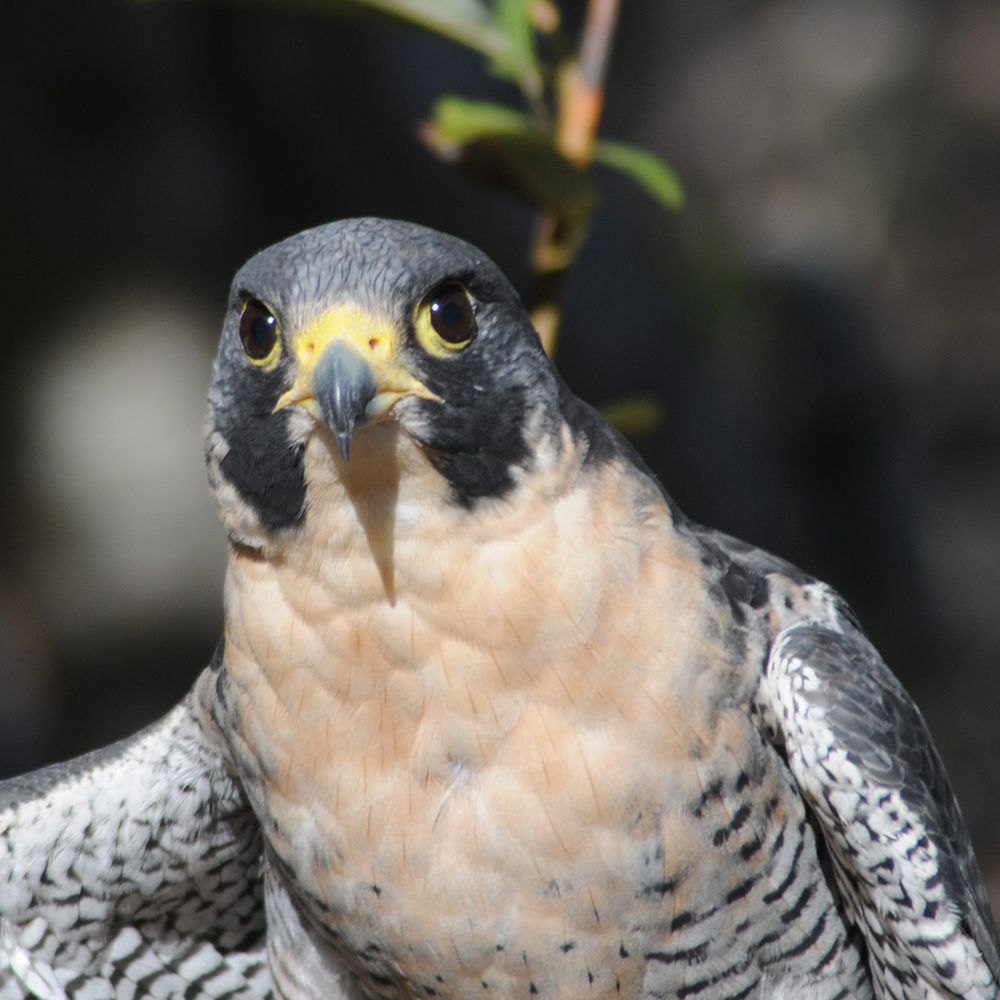Profile | Ryker

-
BirthdayMale, age unknown
-
SpeciesPeregrine falcon
Falco peregrinus -
Professors ofConservation success and speed
-
Field of StudyBird bones
-
Food and Vet Care$131 per month | $1596 each year
About the species
RANGE | Peregrine falcons are found worldwide, except for rainforests and cold, dry Arctic regions. They are one of the most widespread terrestrial vertebrate species in the world. Peregrine falcons prefer habitats such as mountain ranges, river valleys, and coastlines.
FUN FACTS | While they will eat insects and rodents, the most common prey for peregrine falcons is other birds. In fact, other birds make up more than 80% of their diet! Birds eaten include shorebirds, waterfowl, ptarmigan, grouse, and relatives, and smaller songbirds but their most common prey item are pigeons and doves.A peregrine falcon can begin a dive towards another bird from over 2000 feet above the ground. They will tuck their wings against their body and use gravity to increase their speed- reaching over 200 miles per hour- and ball their talons tightly to strike the other bird. The peregrine falcon can do this because it has a one-way air flow into its lungs. The peregrine falcon has air sacs that keep its lungs inflated even when exhaling. The peregrine falcon also has a very strong heart that beats between 600 and 900 times per minute, allowing the oxygen to travel throughout the bird at high rates so it does not fatigue quickly. The amazing speed of its heartbeat allows the peregrine falcon to flap its wings up to four times per second, contributing to its speed.Their hunting of pigeons makes these birds very important in urban settings. Pigeons poop everywhere, which is unsightly and unsanitary, so nest boxes are built on bridges and tall buildings to entice the falcons to manage the pigeon population.
These birds were an endangered species in the US due to duck hunting with lead shot and the use of a pesticide called DDT. Both caused a calcium deficiency so when females laid eggs, the shells cracked and the babies could not survive. One of the most successful conservation programs was on behalf of these birds. In 1999, they were delisted in the US. California is a predominantly agricultural state so it took an additional decade to bring their numbers back up and they were delisted in 2009.
Meet Ryker
Ryker was found on the side of a busy road, bleeding and dragging one of his wings in the gravel. A passing motorist found him and brought him to a local wildlife hospital. As he recovered, it was apparent that the damage to his wing was permanent. While he is still able to fly, he cannot fly high enough or far enough or high enough to survive in the wild.
Ryker loves his den. We were told that these falcons prefer open nesting sites and are not cavity dwellers, but it seems Ryker never read that book! He also loved to hang out on his swing, enjoying the sun.
SPECIAL NEEDS | When Ryker was brought to that wildlife hospital, they noted that he had previous injuries to his feet. We monitor them diligently, and will need to continue periodically treating them throughout his life.
Likes
Ryker likes to manipulate small stuffed animals and rope toys, moving them around his enclosure. He enjoys picking toys and treats from tubes and treat dispensers. Ryker also really responds well when we constantly make changes to his enclosure, such as hanging perches and swings with plastic chains and bungee cords so they move and help to exercise his muscles.
Wishlist
-
Heavy duty dog toysby Kong, Vitscan, Hugglehounds, Ho-lee Roller balls, goDog, oneisall, JollyPets, Dogzilla eggs, different shapes/sizes of BoomerBalls, LPHNSUR ToughDogChews, or others made for chewers
-
Packing materialsHeavy duty mailing tubes of various lengths and widths plus packing boxes to fill
-
Plastic chainsfor hanging feeders and toys
-
Play structurestoddler play structures, kitchens, playhouses, workbenches, and picnic tables
-
Puzzle feedersdesigned for birds
-
Water toysby Outward Hound, Chuckit Bumper, ZippyPaws Floatiez, Kong, or even children’s bath toys like rubber ducks
-
Travel carrierto leave in enclosure for evac training